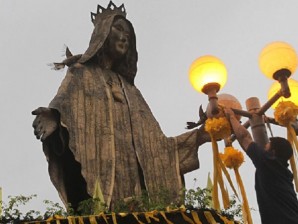
Our Lady of Edsa Shrine: ‘People and God had a brief loving encounter for four days and history cannot be changed anymore.’ FILE PHOTO
The Catholic Church hierarchy was shunted out in the cold in the celebration of the 28th anniversary of the 1986 Edsa People Power Revolution in Cebu City on Tuesday. So were two key military leaders of the uprising: dictator Ferdinand Marcos’ Defense Minister Juan Ponce Enrile and Lt. Gen. Fidel Ramos, then chief of the Philippine Constabulary.
In a thorough revision of Edsa history, President Aquino shifted the celebration to Cebu from Metro Manila, refocusing the spotlight on his late mother, Cory Aquino, and extolled her role as the rallying symbol of the movement to overthrow the Marcos dictatorship, depicting her as the central heroine of the revolution.
Cardinal Sin
Cory was one of the four leaders of the anti-Marcos movement, including the then charismatic Jaime Cardinal Sin, representing the politically influential Catholic Church, and Enrile and Ramos, whose defection from the Marcos regime sparked the military revolt.
It was the call of Cardinal Sin to the people to protect the military rebels from the loyalist forces sent out to crush the revolt that drove to the streets millions of the faithful into a mass movement to oust Marcos.
While the Aquino narrative glorified his mother’s role in the revolution, it completely ignored and obliterated the critical roles of Cardinal Sin and his religious constituency which formed the phalanx of civilians who confronted Marcos’ tanks on Edsa and the buffer around the beleaguered Enrile and Ramos as the two made their last stand in Camp Crame while Cory sought refuge in a religious order’s monastery in Cebu when the military revolt broke out.
No drama in Cebu
There was no Edsa in Cebu, no military revolt there. The stage on which the nonviolent insurrection was played out was in Metro Manila. There was no drama in the streets of Cebu. Cebu was an artificial construct to reinvent the history of Edsa.
The President claimed that Cebu, where his mother was holed up, was the “first chapter” in the drama that culminated its final chapter on Edsa in the national capital.
This narrative represents an audacious falsification of history centered on the Aquino dynasty’s role in the Edsa revolution.
This is why the role of Cardinal Sin was obliterated, and that of Enrile and Ramos was ignored in the Aquino narrative of Edsa.
This sidelining of Sin’s and the Church’s role in Edsa was not lost on the Catholic hierarchy. In a statement on Wednesday, the Catholic Bishops’ Conference of the Philippines (CBCP) said that through the years, the spirit of the 1986 People Power Revolution had been manipulated, abused, raped and prostituted, and nothing had changed after 28 years.
History can’t change Edsa
CBCP president and Lingayen-Dagupan Archbishop Socrates Villegas, a protégé of Cardinal Sin, said he chose to celebrate the anniversary of the revolution at the Edsa Shrine in Mandaluyong City because it was a holy place where heroes bended their knees and stopped the tanks.
But Villegas was disappointed that only a few people attended Tuesday’s celebration in Mandaluyong.
“If they want to celebrate Edsa in Cebu, if they want to celebrate Edsa in Mindanao, let it be,” Villegas said. “But for you, the Edsa Shrine community, stand on this ground because here in this ground, you and God had a brief loving encounter for four days and history cannot be changed anymore.”
The government lost no time in using the decision to shift the venue of the celebration of the Edsa anniversary to Cebu to demonize one of the key players in the military revolt on Feb. 22 in Camp Aguinaldo.
Flimsy cover
A presidential spokesperson said the controversy being faced by key people in the revolt should not change the “sense of people power” among Filipinos.
The spokesperson was referring to the charges filed against Senate Minority Leader Juan Ponce Enrile, one of several lawmakers facing plunder in connection with the scandal over the disbursements of legislators’ Priority Development Assistance Fund, or pork barrel, through spurious nongovernment organizations in exchange for kickbacks.
The spokesperson said this year the Aquino administration was “looking beyond” the historical context of the Edsa revolt to “recognize people who quietly kept the spirit of people power ‘alive’ by standing by their fellow Filipinos in times of need.”
The spokesperson was referring to the initial claim by Malacañang that the President changed the venue of the Edsa anniversary as an opportunity to commiserate with the victims of recent typhoons and natural calamities that devastated Eastern Visayas.
This was a flimsy cover to revise his family’s role in the revolution that restored Philippine democracy, putting it at the center of events.
RELATED STORIES
Retired bishop scores ‘virtual dictatorship’